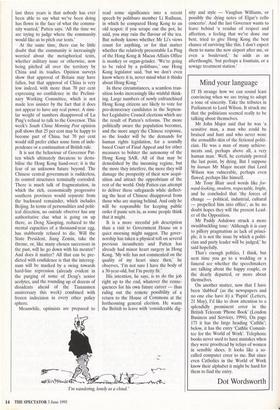Mind your language
IT IS strange how we can sound least convincing when we are trying to adopt a tone of sincerity. Take the tributes in Parliament to Lord Wilson. It struck me that the politicians seemed really to be talking about themselves.
Mr John Major said that he was 'a sensitive man, a man who could be bruised and hurt and who never wore the armadillo skin of the fictional politi- cian. He was a man of many achieve- ments and, perhaps above all, a very human man.' Well, he certainly proved the last point, by dying. But I suppose by human Mr Major meant that Lord Wilson was vulnerable, perhaps even flawed, perhaps like himself.
Mr Tony Blair used words like for- ward-looking, modern, respectable, bright, and he concluded that `the forces of change — political, industrial, cultural — propelled him into office', as he no doubt hopes they will the present Lead- er of the Opposition.
Mr Paddy Ashdown struck a more swashbuckling tone: `Although it is easy to pillory pragmatism as lack of princi- ple, it is not the issue by which a politi- cian and party leader will be judged,' he said hopefully.
That's enough politics, I think, but next time you go to a wedding or a funeral see whether the speechmakers are talking about the happy couple, or the dearly departed, or more about themselves.
On another matter, now that I have been `dubbed' (as the newspapers and no one else have it) a `Papist' (Letters, 21 May), I'd like to draw attention to a splendidly prominent error in the British Telecom 'Phone Book' (London Business and Services, 1994). On page 175 it has the large heading `Cathlic'; below, it has the entry `Cathlic Commit- tee for the World of Work'. Telephone books never used to have mistakes when they were proofread by relays of women in sensible shoes. It looks like a so- called computer error to me. But since even Catholics in the World of Work know their alphabet it might be hard for them to find the entry.
Dot Wordsworth


































































 Previous page
Previous page